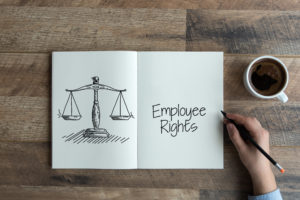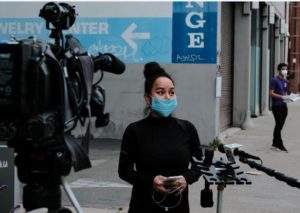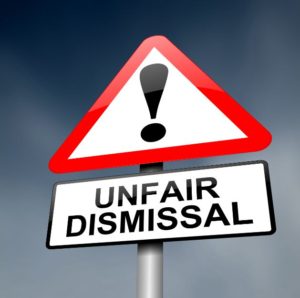YOUR EMPLOYMENT RIGHTS DURING COVID-19
The COVID-19 coronavirus has caused far-reaching changes to normal life in California and other parts of the globe. In addition to health fears, the pandemic has led to dramatic changes at work, which may cause California employees to feel uncertain and worried about their employment. Such feelings are reasonable considering the different unique challenges everyone is facing. Likewise, it can be difficult to stay up to date with employment rights during this time when employment laws are being changed.
Furthermore, the tendency for employers to misuse their power has been a familiar problem for employment lawyers. But it is an important issue, which is highlighted and exacerbated by the current pandemic. Many employers are responding to COVID-19 either by (i) keeping their businesses open and running as far as possible and (ii) cutting costs by any means available. Even though these actions are legitimate, they both come with increased risks of employers abusing their power with the aim to shift the burdens and costs of the COVID-19 pandemic on their workers.
It is understandable that employers want to keep their business open and operating as close to normal as possible. Despite introducing a general lockdown, the California labor law expressly permits people to leave their homes to work where it is not ‘reasonably possible’ to work at home, and the ban on gatherings of two or more people does not apply where these are essential for work purposes. In this time of crisis, it is important for all California employees to understand their rights in the workplace and to know where to turn to if those rights are violated. This post, therefore, focuses on the employee’s employment rights during COVID-19 beyond the statutory health and safety obligations.
EMPLOYEE RIGHTS

It is generally a breach of an agreement for an employee to fail to turn up at their workplace and perform their job, as they would do normally. It may lead to dismissal or corrective action. However, the COVID-19 coronavirus pandemic has altered this basic position in quite a lot of ways. California employers who require their employees to come to work may themselves be breaching the implied duty of confidence and trust owed to their employees, or their duties of care in the contract provided there is one. Whichever way, employees can resign and pursue a constructive claim for dismissal, partially because of the difficulty they may face in finding new work during the crisis.
RIGHT TO A SAFE WORKPLACE
Subject to the California Occupational Safety And Health Act, employees have the right to a safe workplace. Your employer is required to take reasonable steps to ensure your workplace is free from any serious and imminent danger during the Covid-19 coronavirus pandemic, and that includes:
- Performing a COVID-19 risk evaluation
- providing and enforcing the use of face masks, hand sanitizer and other PPE suitable for your workplace
- Introducing social-distancing measures like work station rearrangement, staggering schedules; and thoroughly cleaning and disinfecting the workplace, particularly high-touch objects and equipment.
- Regular adherence to guidance issued by the government.
If you belong to the vulnerable groups of employees, or your employer cannot guarantee most of the safety measures mentioned above and you believe you are in great danger if you return to work, then you have the right to stay at home. You are also free from reprisals or any disciplinary action or pay cuts, which are illegal under the California labor law.
RETURNING TO WORK AND EXPOSURE TO COVID-19
 As California is gradually easing the lockdown, most businesses are also putting things in place for employee’s safe return to work. Employees that return to work to comply with their employer’s instruction may be exposed to catching COVID-19, and the employers to a criminal sanction.
As California is gradually easing the lockdown, most businesses are also putting things in place for employee’s safe return to work. Employees that return to work to comply with their employer’s instruction may be exposed to catching COVID-19, and the employers to a criminal sanction.
What if an employee gets COVID-19 coronavirus on their job and believes it was their employer’s fault. Is it possible for the employee to sue their employer for compensation? With just a few exemptions, California workers who contracted COVID-19 at work cannot sue their employer for the losses arising from their illness (including suffering and pain) in any civil court. Often times, the employee will only be restricted to pursuing relief through a workers’ comp claim.
EXCEPTION TO WORKERS’ COMPENSATION CLAIMS
The exceptions to the workers’ compensation claim are when you were injured or ill because of your employer’s deliberate wrongdoing, severe and willful misdemeanors, contrary to mere negligence. In this case, you may sue your employer outside of the workers’ compensation system.
To prevail on such a claim, the infected worker would have to prove that the employer maliciously engaged in such misconduct. Mere opening up for business after the California government has said it’s okay may not amount to willful misconduct – but opening before that might. Furthermore, employers may face a greater liability risk under such a claim if they carelessly and maliciously fail to provide necessary protective equipment or enforce social-distancing or hygienic guidelines.
THE EXECUTIVE ORDER

In the Executive Order N-62-20 signed on May 6, 2020, California Gov. Gavin Newsom mandated a conjecture that “a worker’s COVID-19-related illness or injury shall be assumed to stem out of the workplace for the purpose of awarding workers’ compensation benefits if some requirements are satisfied”. Under the executive order, the presumption only arises if the worker tested positive for COVID-19 coronavirus or was diagnosed by a qualified doctor as having the disease within 14 days of resuming to work as directed by the employer or at the employee’s place of employment. The presumption does not arise if the employee works from home during that timeframe, or if the worker was otherwise off duty on or after March 19, 2020.
The existence of a presumption does not mean the source of the employee’s infection is undisputable. On the contrary, the executive order confirms that the presumption “may be refuted by other evidence”. Although there probably won’t be a rash of employee lawsuits related to COVID-19, it can be very tricky to establish the basic causative links between the employers’ breach and the employee catching the virus. Therefore, most claims related to the coronavirus may be covered by workers’ compensation, but would usually specify that the employee was exposed to the virus at the workplace and became sick, unable to work, and require medical attention and treatment. Moreover, employees can receive benefits for a work-related illness or injury quickly without having to prove that their employer was at fault. If the employee has paid sick leave benefits exclusively available in response to COVID-19 coronavirus, those benefits should be used before any workers’ compensation benefits are collected.
If you contracted COVID-19 at work or you feel you have good reasons to sue your employer because of their conduct about the COVID-19 pandemic, I would suggest that you consult an experienced employment attorney. United Employees Law Group will explain your options for seeking compensation for the losses you have suffered—whether from contracting the disease at the workplace or from taking steps to prevent it.
WRONGFUL TERMINATION FOR “WHISTLEBLOWER”

Employees that are concerned about safety in their workplace have the right to speak up without fear of retaliation. This is known as whistleblower protection. But if an employee is fired or dismissed due to circumstances where they have raised a health and safety concern or complaint, for instance;
- On the lack of Personal Protective Equipment (PPE) that they consider appropriate for your role (to limit the spread of COVID-19),
- On working in hazardous conditions,
- In violation of stay at home orders or of physician’s orders – then this may be an automatic wrongful termination.
The California labor law prohibits an employer or any person acting on behalf of your employer from wrongful termination or retaliating against their employees for acting as a whistleblower. If having raised a health and safety concern the employees are subjected to unfair treatment from their employer or any person acting on behalf of the employer leading to discrimination/harassment and employment termination, then the employee may have a right of action.
LAYOFF
Laying off an employee is different from firing an employee. Subject to the California labor law, employers are prohibited from firing an employee because they are sick or have COVID-19 or other medical conditions. However, if the employer has no work for the employee, or there is less work than usual or wants to cut costs, the employer may decide to lay off some employees (both sick and healthy).
Laying off workers is one of the toughest decisions for a company and most likely to land an employer in legal trouble. Before laying off workers, employers must have carefully considered different alternatives and set criteria for which employees to lay off. To ease the pain for employees that have been relieved of their employment, they have the right to apply for the new COVID-19 Pandemic Unemployment Benefit.
SICK AND LEAVE PAY
Employees showing symptoms of COVID-19 have the right not to go to work. While they are sick with COVID-19 coronavirus, the employee may be entitled to statutory sick pay from their employer. This is also paid to employees who are self-isolating because someone in their home displays symptoms of COVID-19, or they decide to stay at home due to a high risk of severe illness from COVID-19. The statutory sick pay takes effect from the first day that an employee is self-isolating, provided it is part of the employee’s contract of employment. Otherwise, employers are not mandated to pay their employees if they cannot come to work because they are sick with coronavirus. In such a situation, the employee should apply for the COVID-19 unemployment claim.
If, on the contrary, the employee is not sick, but could not return to work because they have kids or other relatives to cater for, they can ask their employer for paid leave. If the employer denies the paid leave, the employees can ask for statutory leave as specified in the California labor law.
Can An Employer Request to Take The Temperatures Of Their Employees At Work?
Of course, yes. Because of the present pandemic crises, employers can request information from their employees about symptoms, and this includes taking your body temperature at work – and requiring that you stay home if you are sick.
Do Employees Have To Tell Their Employer About Their Medical Condition(s)?
The California Occupational Safety And Health Act allows employers to ask their employees about medical conditions ONLY if it is to protect other workers from infection. Employers may not ask an employee who is asymptomatic (not displaying symptoms of an illness) if they have any medical conditions that might increase their vulnerability to the coronavirus.
For instance, the symptoms of COVID-19 coronavirus include cough, fever, and shortness of breath. Employers may not ask their employees who are not showing those symptoms about any medical condition that may make them more vulnerable to the virus. Employers should, however, inform their workers about the risks of infection. This way, employers may encourage their employees to present any personal medical information, but that depends on the decision of the employee.
WHAT CALIFORNIA EMPLOYERS CAN DO
Employers also have to be careful of this new presumption that a worker’s COVID-19 infection may be an industrial sickness protected by workers’ compensation laws. To protect themselves against possible claims that a COVID-19 infection was caused by willful misconduct, California employers should consult a competent attorney while they prepare to reopen for business.
FINAL THOUGHT
This post is not calling for employees to refuse to work during the COVID-19 pandemic, but that the crisis should also not deny employees (including essential service workers) of their basic right to safe working conditions. United Employees Law Group understands that these are challenging times for both employers and their employees, and we are particularly concerned about helping to protect employee’s jobs, wages, and livelihood as mandated by the “Equal Employment Opportunity Commission” and “California Department of Fair Employment and Housing”.
CONTACT US
If you are concerned about your rights as an employee or you feel your rights have been violated by your employer during this pandemic period, do not hesitate to contact United Employees Law Group. We are here to answer your questions, and help you understand what you can do to protect you and your job during this time.
Photo Credits
shutterstock/David Odisho
Shutterstock/Sam72
Shutterstock/garagestock
Shutterstock/shutteratakan